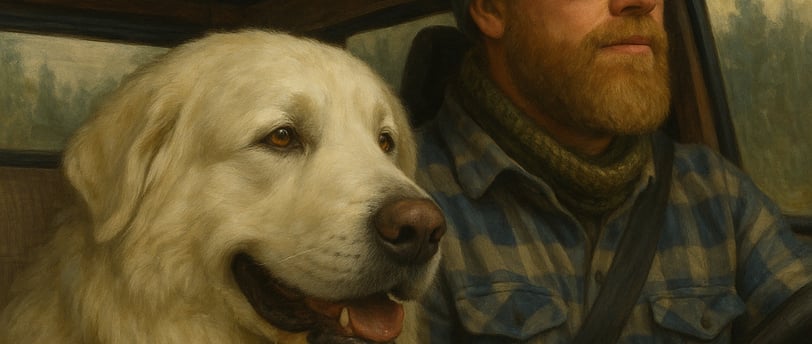Chapter Six: Before the Grid
Before the collapse, before the Grid whispered control into every corner of life, there was a time of freedom. This chapter traces the origin of Seed and Willow’s bond—born in the hills of Humboldt, raised by firelight and river song. Together with Emma, they lived simply, traveling in their Vanagon named Bluebird, harvesting cannabis, cooking for trimmers, and dreaming of a home that never came. As the world edged toward control and collapse, Seed and Willow forged an unbreakable connection—one of loyalty, silence, and survival. This is the story of how it all began.
THE TIN CAN AND THE TOMATO GARDEN
Keith Kalm
6/30/20253 min read


"Tell the story of seed and Willow b4al, before the grid. Seed got Willow while working on a cannabis farm in Humboldt county CA, with his partner Emma, willows mom. They moved and worked in CA and southern Oregon, living along the Illinois river. Then came the first test, as it referred to now, it was called a pandemic, corn virus, maybe. It effected people's lungs, but it was really just the first wave of govern control, but before that, seed and Emma, and Willow would travel in their vanagon bluebird, before the fires consumed a lot of the west coast, and before California, Oregon, and Washington, formed their own Republic , during the trump wars. It was a single time of cannabis, cooking for large group of trimmers, growing our own, before Emma left, b4ai, what seemed like the birth of something amazing, just led to downfall of mankind. But this chapter is more and seed, Willow, how it all began, the bond, the friendship, the love, the journey."
Chapter Six: Before the Grid
Before the world went dark and the stars were swallowed by the static hum of the Grid, there was Bluebird. A dusty blue 1990 Vanagon with rust freckles on her wheel wells and a heart that beat like a woodstove in winter. She carried them—Seed, Willow, and Emma—up and down the spine of the West Coast, weaving a trail of laughter, smoke, and soil between the old-growth forests and the swollen rivers.
Seed met Willow in the high hills of Humboldt, under the sticky sun of a late September harvest. Back then, the cannabis farms were alive—alive with music, bare feet, the thick scent of resin, and the sharp chatter of scissors over sticky buds. Seed had been hired to cook for the trimmers, pulling twelve-hour days barefoot in a converted Airstream kitchen, plating hashbrown stacks, fire-roasted vegetables, and lemon balm teas while the sun crawled across the redwood canopy.
Emma was already there—half wild, all fire—living in a canvas tent with a folding chair and a French press. She knew the plants by name and claimed to have conversations with them. Maybe she did. Seed had followed her laugh through the trees and stayed for the way she touched everything like it mattered.
Willow came to them as a pup, born under a full moon in a neighbor’s barn. Great Pyrenees with a coat like fog and eyes that already knew. They called her Willow for the way she moved—graceful, curious, bending without breaking. She took to Seed like he'd been waiting his whole life for her. He had.
When the harvest ended and the cash was tucked away in mason jars under the floorboards, they drove. Down Highway 101, into the belly of Big Sur, up through Mendocino, across to the Illinois River in Southern Oregon. Sometimes they worked, sometimes they didn't. Sometimes they grew their own, cooking over open fires and soaking in hot springs, making plans for a homestead that would never be.
But nothing lasts, not even peace. The sky began to burn every summer. Ash fell like snow. Fires swept through the valleys like hungry ghosts. Emma grew distant, then gone. She left one morning before the frost, with a note that said "Love isn’t enough, not now."
It was just Seed and Willow after that. B4AL—before the algorithmic lockdowns, before the satellites fell, before the world split into what was and what came after.
And then came the first test. Back then they called it the corn virus, maybe because it choked your lungs like a husk, maybe because it was everywhere—corn syrup, corn news, corn rules. The headlines screamed PANDEMIC, but it wasn’t the sickness that scared them—it was how quickly the fear turned into walls. Into scanners, and checkpoints, and digital chains. A test, it turns out, of who would kneel.
But not Seed. Not Willow. They retreated further—into the wilderness, off-grid, along the riverbanks, sleeping under stars that still spoke truth. They grew kale and collards in the rocky soil, bartered with moonshiners and seed-savers, and lived quietly. Together.
Willow grew into her paws. A guardian. A friend. She knew when to bark and when to sit, when Seed’s silence needed breaking and when it needed holding. When the van wouldn’t start, when the rain came, when the world tilted—she was there.
Bluebird rusted. The gardens wilted. The Republic of Cascadia declared itself independent. The Trump Wars began and with them, the final fracture.
But none of that mattered, not in this chapter.
This is the chapter of before. Of early morning coffee with paws in the lap. Of wet noses in sleeping bags. Of the crackle of firewood and the rustle of wind in the trees. This is the story of a man who lost everything but found his soul in the eyes of a dog. The world would change. People would fall. The Grid would rise.
But before all that, there was just Seed and Willow.
And that was enough.
